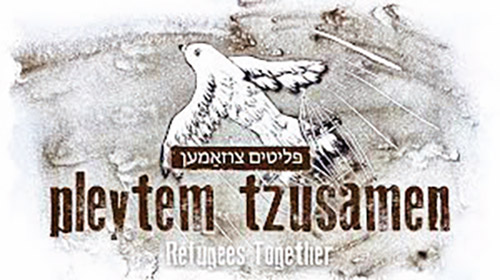
As Jews prepare to celebrate the Exodus from Egypt, they are reminded of their long history of wandering and sojourning. Jews have always been travelers. The Silk Road contains sites of ancient synagogues located every six days’ journey, so Jewish traders could celebrate Shabbat. To this day, Jews traditionally prepare enough to welcome any traveler in want of a Shabbat or festival meal. And Israel continues to welcome refugees and make the transition as pleasant as possible.
Never before in history has so much movement of people taken place. Never before have so many people in the world sought refuge from drought, floods, famine or terror imposed by totalitarian regimes. It is impossible to imagine the extent of the hardships, physical and emotional, that today’s refugees suffer.
Josh Waltezky addressed the plight of refugees in his song cycle, Pleytem Tzusamen (Refugees Together), in 2019 at the Yiddish Festival in Weimar, Germany. This Sunday it will have its American premier at the National Yiddish Theatre Folksbiene (NYTF), based in the Museum of Jewish Heritage in Battery Park City: A Living Memorial to the Holocaust (MOJH). The setting affords a spectacular view of Ellis Island and the Statue of Liberty, which was a much-longed-for sight for those seeking refuge, freedom and opportunity.
The concert was conceived by Waltezky, a second-generation American whose mother was a refugee. He graduated from Harvard with a degree in mathematics and linguistics, then went on to study cinematography at New York University.
The son of Yiddishists who moved their family from New Jersey to the Bronx, Waletzky attended a Sholom Aleichem school and Camp Boiberik (in Rhinebeck, New York.) He inherited his father’s love for Yiddish songs, family and humanity, and is not only a cinematographer, poet, singer, musician, composer and preservationist, he is a resurrectionist who played a vital role in popularizing the nearly defunct Klezmer music and the songs of the Shoah.
One of Waletsky’s Boiberik campmates was Zalmen Mlotek, a musical wizard who is the artistic director of the Folksbiene. Mlotek is the son of Joseph and Chana Mlotek who are being honored by YIVO for their tremendous work in rescuing and preserving Yiddish songs. Zalmen is directing the chorus for the Pleytem Tzusammen concert. It will feature some of the world’s top musicians and singers, a number of whom are refugees.
Daniel Kahn, the Detroit born musician, singer, composer and actor who lives with his wife and son in Germany, to which his wife emigrated with her parents from the former Soviet Union, will be featured as well. Kahn did not grow up speaking Yiddish but learned it at YIVO and from Chana Mlotek. He became a highly accomplished translator whose Yiddish versions of popular compositions such as Leonard Cohen’s “Hallelujah” are extraordinary. He is one of the many master singers and musicians who hope to open hearts and minds to the problems and difficulties refugees face as well as to the resilience they display and contributions they (and their descendants) make.
Given that Yiddish is not commonly spoken in the world, and is, in fact, accessible to very few, it has limited commercial prospects. Yet, remarkably, Waletzky, who has been called the poet laureate of Yiddish, chose to compose both these works intended for a wider audience, in Yiddish. They are his responses to terror and trauma, as well as hope, and speak to not only his love for the language but also his profound understanding that the mamaloshen is the perfect language to express these thoughts and feelings. His menschlichkeit shines through his words and music, as does his belief that there is a future for Jews, as well as the language that so many of the world’s Jews wrote, spoke and sang in a century ago. He is very fortunate to be connected to an institution dedicated to keeping both the history of the Holocaust and the language of most of its victims and survivors alive.
A co-production of NYTF and MOJH, Pleytem Tzusamen will have two showings at the museum, this Sunday, March 26, at 1 p.m. and 6 p.m. The show will be presented with supertitles in English and Ukrainian and will feature projected pictures of sand art by Ukrainian Jewish artist Zhenya Lopatnik. One image, of a dove breaking out of its cage and flying upward, seems a perfect symbol of the hope and longing for peace that refugees seek.
By Barbara Wind










